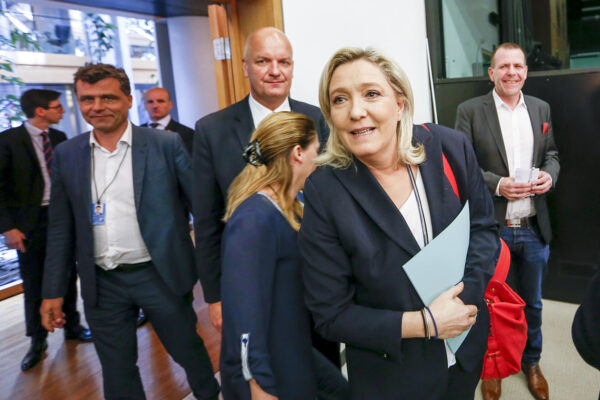
Polls suggest five candidates could qualify for the decisive second voting round of the French presidential election.
They range from the far left to the far right, but a look at their policies suggests that these categories may have outlived their usefulness.
Jean-Luc Mélenchon and Marine Le Pen are supposed to be on opposite ends of the political spectrum, yet they make common cause against the European Union and NATO.
The center-right candidate, François Fillon, shares their friendly attitudes toward Russia. But Fillon sides with the left-wing Benoît Hamon and the center-left Emmanuel Macron in arguing for a more political eurozone.
Le Pen’s economic policies have more in common with the left than the mainstream right. Fillon and Macron, on the other hand, share proposals for labor reform — but they have different social views. The Republican is a Catholic and social conservative who agrees with Le Pen that the French must protect their identity. The independent Macron is socially liberal and pro-immigration.
All candidates want cleaner energy, but where Fillon, Macron and Le Pen see nuclear as part of the solution, Hamon and Mélenchon want to phase it out alongside fossil fuels.
Here is an overview of the signature policies of all five candidates.
Emmanuel Macron
The former economy minister has polled neck and neck with Le Pen at 25-26 percent support since the beginning of March. He proposes to:
- Loosen the 35-hour workweek and give firms more flexibility.
- Cut corporate tax and social charges.
- Extend unemployment insurance to freelancers.
- Cut €60 billion in government spending over five years, including by eliminating 120,000 public-sector jobs.
- Tax Internet companies on the profits they make in France.
- Lift the ban on medically assisted procreation.
- Shorten asylum procedures and require command of the French language.
- Turn the eurozone into a political union.
- Reduce nuclear energy and incentivize the purchase of cleaner cars.
Marine Le Pen
First-round support for the leader of the National Front has been stable for months at 25 to 27 percent, but no survey has put her in the lead for the second round. She proposes to:
- Raise the costs of hiring foreign workers.
- Reduce income tax for the lowest incomes.
- Impose an import tax on products made by French companies abroad.
- Lower the retirement age from 62 to sixty.
- Ban the wearing of all visible religious symbols in public spaces.
- Reduce immigration to 10,000 people per year.
- Eliminate birthright citizenship.
- Take away French nationality from jihadis and expel foreigners suspected of being radicalized.
- Reintroduce a three-month military service.
- Leave the euro and Schengen free-travel area. Hold an in-out referendum on EU membership.
- Pull France out of NATO’s command structure and partner with Russia.
- Promote nuclear power.
- Introduce proportional representation and reduce the number of legislators.
François Fillon
Support for the center-right Republican candidate has come down from a 25-percent high to an average of 17 percent since it was revealed he paid family members a public salary for seemingly non-existent work. He proposes to:
- Scrap the 35-hour workweek in the public and private sectors.
- Reform labor laws to give business more flexibility.
- Reduce social charges on the lowest salaries to encourage hiring.
- Cut corporate tax by €40 billion.
- Cut €100 billion in government spending over five years, including by eliminating half a million public-sector jobs.
- Raise the retirement age from 62 to 65.
- Limit parental rights for gay couples.
- Emphasize French history in schools.
- Limit immigration through quotas and stricter family reunification and nationalization requirements.
- Reduce the age of criminal responsibility to sixteen.
- Take away French nationality from jihadis and expel foreign criminals.
- Strengthen EU defense cooperation.
- Turn the eurozone into a political union.
- Lift sanctions on Russia and cooperate with it in Syria.
- Scale up nuclear energy sites; close coal-fired power stations.
Jean-Luc Mélenchon
Support for the far-left candidate fell when the Socialists nominated Hamon in January but has since climbed back up to around 15 percent. He proposes to:
- Raise the minimum wage and salaries in the public sector.
- Cap private-sector salaries at twenty times the median income. 100 percent income tax on higher earnings.
- Roll back Macron’s labor reforms.
- Guarantee full employment.
- Raise public spending by €250 billion per year.
- Lower the retirement age from 62 to sixty.
- Lift the ban on medically assisted procreation and legalize marijuana.
- Regularize illegal work and build more shelters for asylum seekers.
- Leave NATO.
- Leave the EU unless treaties can be renegotiated.
- Commit to 100 percent renewable energy by 2050. Phase out fossil fuels and nuclear.
- Renationalize utilities.
- Introduce proportional representation and make voting compulsory.
Benoît Hamon
The Socialist Party candidate briefly surged into fourth place after his nomination in January, but his support has since come down to just over 10 percent. He proposes to:
- Introduce a universal basic income and raise the minimum wage.
- Roll back Macron’s labor reforms.
- Invest €100 billion in environmental and urban renovation over five years.
- Raise taxes on robots and banks’ “super profits”.
- Lift the ban on medically assisted procreation.
- Legalize marijuana and assisted suicide.
- Create a new humanitarian visa system for refugees.
- Turn the eurozone into a political union.
- Commit to 100 percent renewable energy by 2050. Phase out diesel and nuclear.
- Introduce proportional representation and a single, seven-year presidential term.
